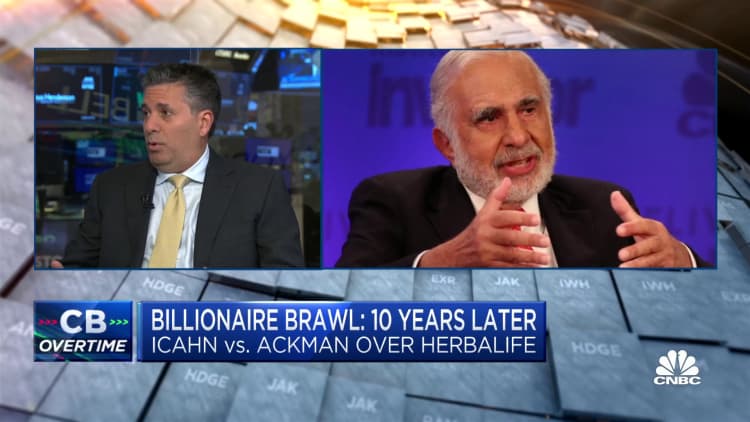Billionaire investor Bill Ackman said he is betting against 30-year U.S. Treasurys as a hedge against the impact of long-term rates on stocks in "a world with persistent 3% inflation."
Ackman, the founder of Pershing Square Capital Management, also said he is "short in size" on the 30-year U.S. Treasurys because it's "a high probability standalone bet."
In a post on X, the social media platform formerly known as Twitter, Ackman said he believes this to be one of the few macro investments that "still offer reasonably asymmetric payoffs" — where the potential for upside gains is greater than the downside risk.
"We implement these hedges by purchasing options rather than shorting bonds outright," Ackman said said late Wednesday. "There are many times in history where the bond market reprices the long end of the curve in a matter of weeks, and this seems like one of those times."
The hedge fund manager's bearish comments come a day after ratings agency Fitch downgraded the U.S.'s long-term rating to AA+ from AAA, drawing ire from the White House and underscoring grave concerns regarding the growing U.S. fiscal deficit.
Ackman argued that if U.S. inflation is 3% in the long term instead of 2%, 30-year Treasury yields could hit 5.5% "and it can happen soon."
U.S. inflation stood at 3% in June, while yields on 30-year Treasury hit 4.2% — its highest since early November.

"I have been surprised how low US long-term rates have remained in light of structural changes that are likely to lead to higher levels of long-term inflation, including de-globalization, higher defense costs, the energy transition, growing entitlements, and the greater bargaining power of workers," he said.
Ackman pointed to several factors including the desire of China and other countries to decouple financially from the U.S., growing concerns about U.S. governance, fiscal responsibility and political divisiveness — the latter three issues prompted the latest Fitch downgrade.
He also anticipated the ending of yield curve control in Japan would increase the relative appeal of Japanese government bonds versus U.S. Treasurys. Japanese investors are currently the largest foreign buyers of U.S. Treasury bills.
The best hedges are the ones you would invest in anyway even if you didn't need the hedge.Bill AckmanFounder, Pershing Square
The Bank of Japan unexpectedly loosened its yield curve control of 10-year Japanese government bonds on Friday, pledging greater flexibility in allowing yields to rise to 1% from its current 0.5%. The move was an adjustment to sustain its long-running ultra-easy monetary policy position.
"I have also been puzzled as to why the (U.S. Treasury Department) hasn't been financing our government in the longer part of the curve in light of materially lower long-term rates," Ackman said. "This does not look like prudent term management in my opinion."
Ackman said long-term Treasurys also appear to be overbought.

"With $32 trillion of debt and large deficits as far as the eye can see and higher [refinancing] rates, an increasing supply of [Treasurys] is assured," he said. "When you couple new issuance with [quantitative tightening], it is hard to imagine how the market absorbs such a large increase in supply without materially higher rates."
Ackman said in March that he will no longer take part in vocal activist short-selling campaigns, a practice he engaged in that led to one of the most colorful battles in Wall Street history, including a five-year battle against Herbalife which ended with massive losses in 2018.
The billionaire investor shorted mortgage loan companies FannieMae and FreddieMac in 2007 before the great financial crisis, which turned out to be successful bets.
"The best hedges are the ones you would invest in anyway even if you didn't need the hedge," he said of his call against 30-year Treasurys late Wednesday. "This fits that bill, and also I think we need the hedge."


